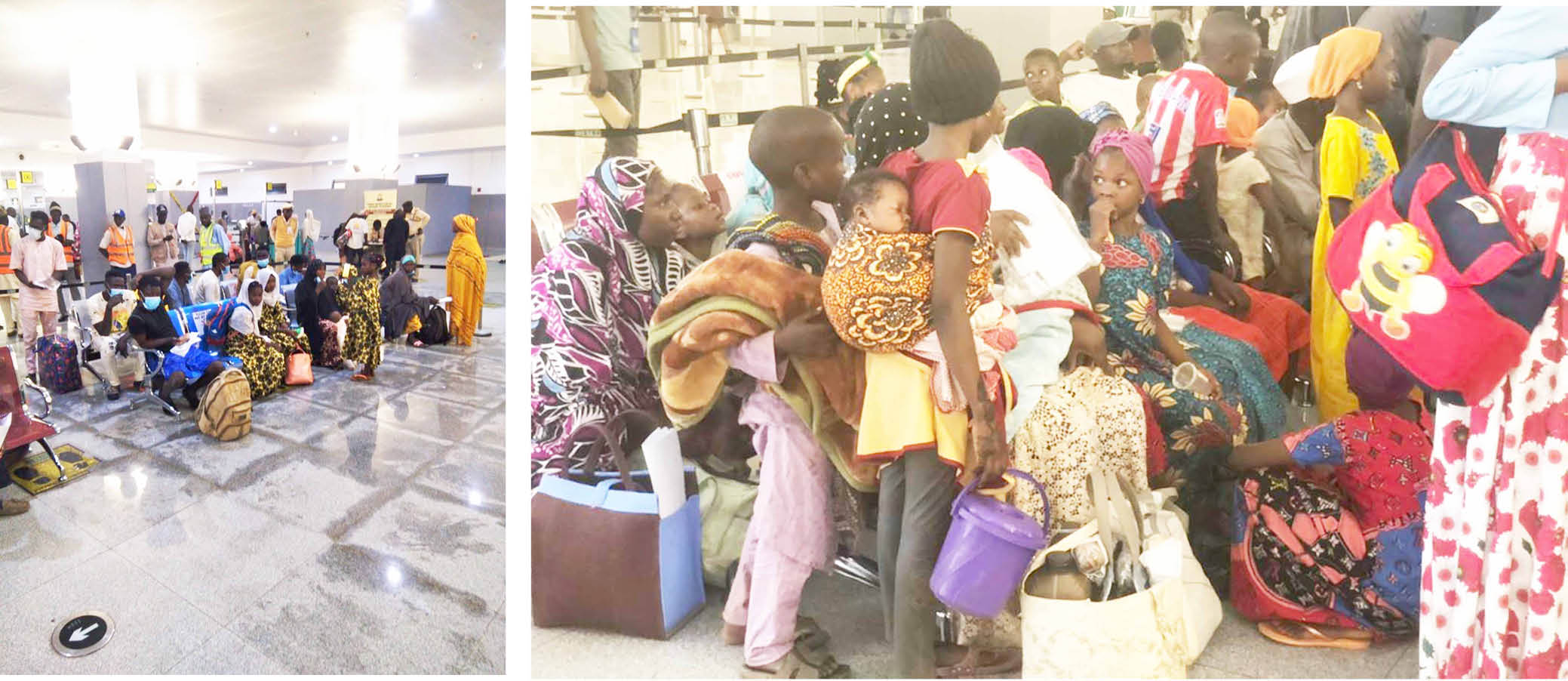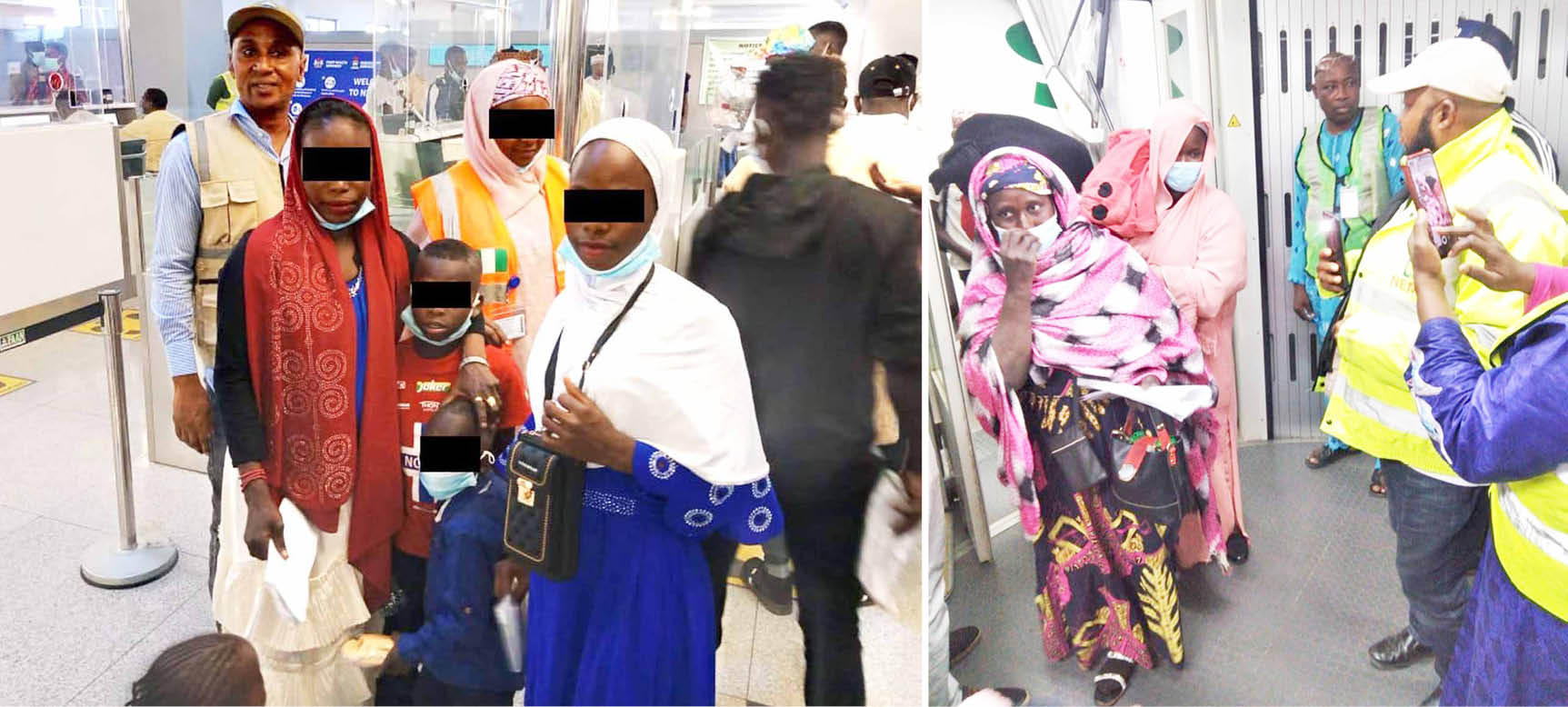Recently, many Nigerians have developed the penchant to travel abroad with the belief that the land is greener on the other side, but this quest has pushed so many to explore whatever means that is at their disposal to ensure they leave the country. Unfortunately, many get on the wrong side of the divide, the story tells about the experiences many had while seeking greener pastures outside Nigeria.
Usman Kabir’s dream of leaving Nigeria to seek greener pastures in Algeria was halted as he and hundreds of travellers got stranded in Niamey, the Sahara area of the Niger Republic. They got trapped in an environment where a sip of water is sold at nearly N1,000, amidst the fear of death as a result of unbearable heat and attacks from armed robbers. They were helpless and already regretting their decision to leave their country, where they enjoyed full freedom to move everywhere.
Kabir said he sold his only plot of land at the rate N150,000 to sponsor himself for the journey. This was after his friend impressed upon him the “abundance” that lay before him in Algeria. He said that his friend, who is currently in Algeria, convinced him. He was amused and further convinced by the amount of money he said his friend was sending home for the purchase of plots of land and even houses.
“I was a phone repairer before I left for Algeria through Niger Republic. I saw one of my friends sending money to his parents from Algeria; that was why I decided to seek greener pastures. My dream of becoming rich has ended. I feel shy to go back to my family because I came back with nothing.
- NASS leadership: Why competence shouldn’t be sacrificed for sentiments
- Analysts renew calls for fuel subsidy removal as payment gulps N3.2trn
“My parents are poor and I am the first born, so I decided to travel to enable me to cater for my parents and siblings; but unfortunately, I was stranded at Sahara. Many people died of snake bites and other difficulties,” he narrated with teary eyes.
Unlike Usman Kabir, Hajiya Maryam Mukhtar, a widow, succeeded in reaching her intended destination – Libya. Although she passed through a lot of difficulties, she couldn’t relax as she suffered several attacks and harassment from her Libyan employer, who she said always wanted to sleep with her.
“We are suffering with my kids and aged mother. That was why I travelled to Libya for greener pastures. I got a job in an Arab man’s house, and every night he threatened to sleep with me, which I refused and decided to come back to my country. My Arab employer pointed a gun at me and said that if I told his wife his intention to sleep with me he would kill me,” she said.

Daily Trust on Sunday gathered that hundreds of Nigerians, including young and old women, with their children, had gone through a lot of difficulties and risking their lives to travel to neighbouring African-Arab countries seeking greener pastures. Some of them with the intent of going to Europe, the migrants mostly left their home country in the name of hardship, coupled with a lot of psychological traumas, as well as unemployment.
This is to the extent that many people lost their lives, while several others got attacked and robbed, with some ending in prisons over various offences relating to illegal migration. Similarly, women become sexually harassed in the process.
According to the Mixed Migration Centre (MMC, Europe) in its publication: The Journey Towards Italy for Nigerians: Drivers, Routes and Use of Smugglers, there are three main reasons that forced Nigerians to leave the country for another to seek a better living.
The findings of the research revealed that Italy, with approximately 119,000 Nigerians on its territory, hosts the second-largest group of Nigerians in Europe (after the UK) and is “the most important destination for Nigerian victims of trafficking”.
“The three main reasons for leaving Nigeria were violence, insecurity and conflict (52%), personal or family reasons (46%), as well as rights and freedoms (38%). As violence-related drivers, women often mentioned SGBV and domestic violence.
“All Nigerian migrants followed the Central Mediterranean Route through Libya to arrive in Italy. The vast majority passed first through Niger (89%) (Stopping in Agadez) then Libya (88%) (stopping in Tripoli and Sabha). Forty per cent of those who stopped in Libya mentioned having been detained or otherwise held against their will,” research findings read in part.
Why Nigerians keep travelling despite ordeals
With the harrowing tales reverberating across the country the National Emergency Management Agency (NEMA) said it had repatriated 1,003 stranded Nigerians from Niger Republic and Libiya to Kano in 2022 only, and it had so far received 444 returnees from Libya and Algeria in the first three months of 2023, making the total number to be 1, 447 within one year.
In an interview with Daily Trust on Sunday, Dr Nuradeen Abdullahi, NEMA coordinator, Kano Territorial Office, said the returnees they had been repatriating over the years were either on their way to European countries and could not afford to return when their journey became frustrated in Niger Republic, Libya or Algeria.
He said that based on their interactions with the returnees, the main reason for them travelling was for greener pastures, and that sometimes they were invited by friends or relatives who succeeded in reaching those countries and doing menial jobs.
‘I saw many Nigerians in Algerian, Libyan prison’
Narrating their ordeal when they were received in Kano, one of the returnees, Izehi Solomon Kamsi, 30, from Abia State, said he paid $500US to be smuggled to Libya but ended up in prison in both Libya and Algeria. He lamented that he could not fulfill his dream of reaching Germany.
“In Libya, on my way to cross the Mediterranean Sea, I was jailed for six months while in Algeria; I spent two months in prison. I suffered a lot because I spent three years in the Sahara while trying to go to Germany to seek greener pastures, but ended up in prison.
“I regretted ever travelling as many Nigerians are still in the desert and some in prison. Only God knows when they will be released. In prison, they used to treat Nigerians differently. They said we had wealth but risked our lives to go to other countries,” he said.
Also sharing her sufferings, Jamila Theophilus, a single mother of two from Benue State, said she travelled to Libya to seek greener pastures because her father died and left her with her sick mother and three siblings. But instead of finding the promised greener pasture in Libya, she returned home with two kids, whose father is nowhere to be found.
“I met the father of my two kids in Libya. We were not married, and now, he is nowhere to be found. I am ashamed to go home because instead of bringing money, I brought back two kids without knowing the whereabouts of their father,” she said.
‘How we are coping in Libya, Algeria’
Meanwhile, as hundreds of people find it difficult to reach their intended destinations and some were frustrated, there are few that succeeded in reaching countries like Libya, Algeria and even Europe and are ‘happily’ living there.
In a WhatsApp chat with Usaini Lawal, one of the people who left Nigeria in 2018, he said that if not for his parents he would never attempt to come back to Nigeria as he was ‘doing well.’
“Although we don’t have the kind of freedom we have in Nigeria, the money we are generating and the serene environment is making us forget all the challenges we are facing.
“We are doing menial jobs here, but if you have skills you would make money. I am into decoration of buildings, which is why every day I have work to do. Others are people like tailors, masons and so on. But women normally run errands in homes, and they face challenges more than we do,” he said.
Lawal said, “If you see me in Nigeria, it is just to greet my parents. From here I am moving to Europe. That is how the journey is. But if you are not lucky you may even die on the way before reaching here and nobody will wait to take you back home. This is the riskiest journey I have embarked on in my life. But I succeeded.”
Way out
On what should be done to stop the act, Nuruddeen Abdullahi of the National Emergency Management Agency, the coordinating agency for the repatriation of returnees, said there was the need for a massive campaign against the illicit travels by all stakeholders. He said the general public, mostly the youth and women, should be sensitised about the dangers of these trips.
“As you can see, we interacted severally with these people that were repatriated and discovered that what they went through in these countries was terrible.”
He added that there is a need for serious surveillance across our borders, saying, “There are some middlemen that facilitate their going to these countries, and if they get a job, they get paid from their salaries. These middlemen should be traced and punished accordingly so that it will serve as deterrence to others.”
He told young people and women that there was nowhere better than their country, saying that everywhere, there are opportunities and it depends on their determination to pursue a better life.
Also speaking, Tunde Salman, an expert on migration with the Good Governance Change (GGC), a non-governmental organisation, said people embarked on irregular or non-documented migration for many reasons, some of which are unemployment, insecurity and the prospect of better working conditions elsewhere.
He said what continued to be worrisome was that despite an increased awareness campaign by various stakeholders, the desperation to travel is on the increase, irrespective of the routes that people want to use and at the end of the day they end up stranded and begin to call for help.
“But we should not relent on the effort to continue awareness of the dangers of irregular migrations. Rescued victims of irregular migration/trafficking should be used to tell potential migrants what they have gone through. That if you have a business or employment in your country, it is better you manage it for survival.
“On the other hand, governments also need to increase their responsibilities to enable people to see hope in their country; and also make them see the need to stay in the country by providing an enabling environment for businesses to thrive. These will discourage irregular migration,” he said.
He added that most importantly, stakeholders should provide most of the things people see abroad. “Let there be a substitute at home, such that even if they travel, let it be on a regular way. There should be increased governance on labour migration. Thank God that the Federal Executive Council (FEC) recently approved the new National Labour Migration Policy, which if implemented would address labour migration gaps,” he said.

 Join Daily Trust WhatsApp Community For Quick Access To News and Happenings Around You.
Join Daily Trust WhatsApp Community For Quick Access To News and Happenings Around You.


